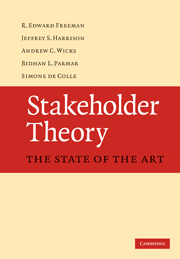Book contents
- Frontmatter
- Contents
- List of figures
- List of tables
- Acknowledgements
- Preface
- Part I The genesis of stakeholder theory
- 1 The problems that stakeholder theory tries to solve
- 2 The development of stakeholder theory: a brief history
- 3 Stakeholder theory, pragmatism, and method
- Part II Stakeholder theory and the traditional disciplines of business
- Part III Stakeholder theory, ethics, and corporate social responsibility
- Part IV Stakeholder theory: some future possibilities
- Bibliography
- Index
3 - Stakeholder theory, pragmatism, and method
a brief history
from Part I - The genesis of stakeholder theory
Published online by Cambridge University Press: 05 June 2012
- Frontmatter
- Contents
- List of figures
- List of tables
- Acknowledgements
- Preface
- Part I The genesis of stakeholder theory
- 1 The problems that stakeholder theory tries to solve
- 2 The development of stakeholder theory: a brief history
- 3 Stakeholder theory, pragmatism, and method
- Part II Stakeholder theory and the traditional disciplines of business
- Part III Stakeholder theory, ethics, and corporate social responsibility
- Part IV Stakeholder theory: some future possibilities
- Bibliography
- Index
Summary
Many of the arguments in this book will seem unusual to those scholars who are accustomed to reading the traditional management journals, such as Academy of Management Review, Academy of Management Journal, and Administrative Sciences Quarterly. Indeed, traditional philosophers who teach business ethics and read the Journal of Business Ethics and Business Ethics Quarterly may also not recognize the kind of arguments that we use here. Each of the intellectual communities of which these journals are a part has fairly well-defined ideas about the use of such terms as “theory,” “method,” “hypothesis,” “proposition,” and other philosophical concepts. While we respect, reference, and quote the bodies of literature that are contained in these and many other management and philosophy journals in the succeeding chapters, our approach is somewhat different. Consequently, we want to be as clear as possible that we are philosophical pragmatists about most issues around theory and method. In this short chapter we shall try to say what our view is about this pragmatism and why we believe that it can serve as a set of unifying ideas around a body of literature that has begun to change the underlying narrative about business.
There has been a great deal of discussion about what kind of entity “stakeholder theory” really is. Some have argued that it is not a “theory,” because theories are connected sets of testable propositions.
- Type
- Chapter
- Information
- Stakeholder TheoryThe State of the Art, pp. 63 - 80Publisher: Cambridge University PressPrint publication year: 2010



